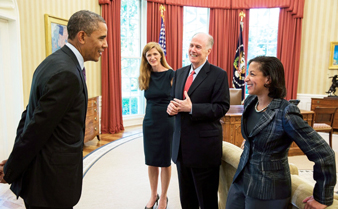JIM.LOBE and Thalif Deen

WASHINGTON/UNITED NATIONS (IPS) – In a reshuffle of top foreign policy posts in his second term, U.S. President Barack Obama announced that his controversial and blunt-spoken UN ambassador, Susan Rice, will replace Tom Donilon as his national security adviser.
He also announced that another longtime aide on the National Security Council staff who began working with Mr. Obama when he was still a freshman senator from Illinois, Samantha Power, will replace Ms. Rice as Washington’s UN envoy, a cabinet position.
The moves, which had been anticipated but whose precise timing was uncertain, are considered unlikely to signal major changes in U.S. policy, despite the fact that both appointees Power and Rice have been associated with the more-interventionist tendencies within the Democratic Party.
“I don’t think this change in personnel marks a turning point in policy,” said Charles Kupchan, a senior fellow at the Council on Foreign Relations.
“From the get-go, foreign policy under Obama has been run from the (White House) Oval Office, and Obama’s brain trust has included primarily a small inner circle of folks that cut their teeth on the (2008 presidential) campaign. Susan Rice and Samantha Power have been part of that inner circle all along.”
“I see the move as a confident second-term president promoting people who will be more visible,” noted Heather Hurlburt, director of the National Security Network, a think tank considered close to the administration.
“Donilon’s great strength was his managerial skill and willingness to work behind the scenes. Rice’s public persona is one of her great strengths, and I’m sure the White House will use it.”
“Power will be one of the people most knowledgeable about the UN that the U.S. has ever sent to represent us there, and that’s quite a statement about the U.S. commitment to that organization’s potential,” she added, noting that Ms. Power’s knowledge is based on her years as a journalist and author covering the world body and some of its most controversial and difficult missions.
Late last year, Ms. Rice was considered President Obama’s first choice to replace Hillary Clinton as secretary of state but withdrew from consideration after Republicans accused her of deliberately misleading the public about events surrounding the killing of the U.S. ambassador to Libya and three other U.S. personnel in last September in Benghazi.
She will be Mr. Obama’s third national security adviser. Unlike secretary of state or UN ambassador, the national security adviser is not subject to Senate confirmation.
Unlike choices Rice, Donilon, or Power, the first national security, Gen. James Jones (ret.), was never close to President Obama and tended to see his work primarily as coordinating the advice of the other top national-security officials, notably the secretaries of defense and state and the director of national intelligence.
After two years, Mr. Donilon, Gen. Jones’ deputy and a Democratic political heavyweight, replaced him, moving quickly to concentrate foreign policymaking in the White House and greatly increasing the size and workload of the NSC staff.
A top aide to Secretary of State Warren Christopher during President Bill Clinton’s first term, Mr. Donilon is given credit for a number of major strategic initiatives–most recently, promoting June’s informal and potentially historic California summit between President Obama and Chinese President Xi Jinping.
Indeed, one prominent NSC historian, David Rothkopf, wrote on foreignpolicy.com June 6 that his “greatest contribution was his strategic mindset” that led to “… a restoration of balance to the U.S. national security agenda, a move away from the conflict-dominated view of the years right after 9/11 to one that is more global and has room to consider opportunities, new alliances, and new challenges more effectively.”
If Mr. Donilon was more inclined to the more non-interventionist stance of his mentor, Warren Christopher, Ms. Rice is best seen as the protégée of Clinton’s second-term and more-interventionist Madeleine Albright whom she has known since childhood and served as assistant secretary of state for African Affairs.
Haunted by Washington’s refusal to act during the 1994 Rwandan genocide (when she worked on Clinton’s NSC), Ms. Rice, as well as Ms. Power, has been a leading exponent of the Responsibility to Protect (R2P), the doctrine that the international community has a responsibility to intervene in order to prevent genocide or mass atrocities if the otherwise sovereign state is unwilling or unable to do so.
“Power and Rice are smart, tough, and experienced. But both are firmly in the interventionist consensus that has guided U.S. foreign policy for many years, and neither is going to go outside the mainstream on any controversial issues,” Stephen Walt, a prominent international-relations professor at Harvard University’s Kennedy School of Government, told IPS in an e-mail message.
Citing R2P, both advisors Rice and Power reportedly played an important role in persuading Mr. Obama to intervene in the civil war in Libya, although, significantly, Ms. Rice sided with Mr. Donilon against other cabinet officials and CIA director Gen. David Petraeus who recommended a limited military intervention on behalf of rebels in the Syrian civil war late last year, according to numerous published reports.












